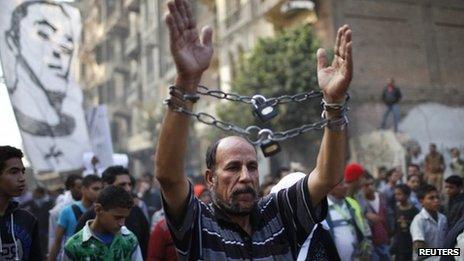Egypt crisis: Mohammed Mursi tries to defuse tension
- Published

Egyptian President Mohammed Mursi has sought to defuse a crisis over efforts to extend his own powers, during talks with senior judges.
Mr Mursi told them that a decree banning challenges to his decisions would stand, but that it would be limited in scope, his spokesman said.
The decree has led to violent unrest, and opponents will hold new protests on Tuesday to demand its withdrawal.
However, Mr Mursi's Muslim Brotherhood has called off its own rival rally.
'Public tension'
After Mr Mursi's five-hour meeting with members of the Supreme Council for the Judiciary on Monday, presidential spokesman Yasser Ali said the president had told the judges he respected judicial independence.
Mr Ali made it clear the president would not withdraw the decree, but said Mr Mursi had reassured the judges that its scope would be restricted to "sovereign matters", designed to protect institutions.
There is no word so far from the judges, but the BBC's Jon Leyne in Cairo says this is a formula the judges have previously indicated they would accept.
The presidential spokesman also said there would be no further retrials of officials who worked under President Hosni Mubarak, who was ousted in last year's revolution, unless new evidence were presented.
Opposition protests against the decree will go ahead on Tuesday.
Mona Amer, a spokesman for the opposition movement Popular Current, told Reuters: "We asked for the cancellation of the decree and that did not happen."
However, the Muslim Brotherhood said it was postponing its demonstration in support of Mr Mursi to avoid "public tension".
The group had called for a million-man march to take place outside Cairo University.
Our correspondent says the postponement is another sign that the government wants to defuse a dangerous confrontation, but it remains to be seen whether it ends the days of angry and sometimes violent protests.
Several prominent opposition leaders, including Nobel Peace Prize laureate Mohamed ElBaradei, have said they will not engage in dialogue until the president rescinds the measure, known as the constitutional declaration.
The decree, issued last week, said no authority could revoke presidential decisions.
There is a bar on judges dissolving the assembly drawing up a new constitution. The president is also authorised to take any measures to preserve the revolution, national unity or safeguard national security.
Critics said the decree was an attack on the judiciary and placed the president above the law.
It has sparked violent protests in Cairo and across the country. Many judges and prosecutors went on strike.
On Sunday, teenager Islam Fathy Massoud died and 60 people were injured in clashes in the Nile Delta town of Damanhour between the president's supporters and opponents.
His funeral was held on Monday, while in Cairo thousands of people marched through Tahrir Square for the funeral of another young activist killed in recent clashes with police.
Egypt's stock market, which had seen a fall of almost 10% on Sunday, recovered some ground on Monday morning.